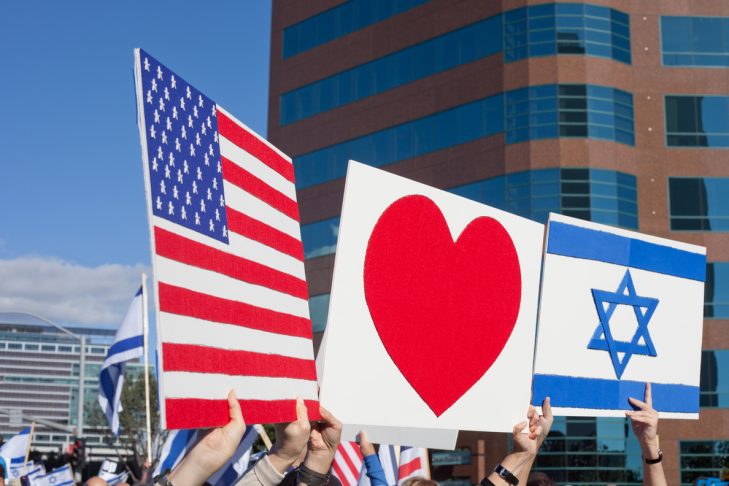This year is not only filled with significant anniversaries connected to Israel—including the 100th anniversary of the Balfour Declaration and the 50th anniversary of the reunification of Jerusalem—it’s also a unique and optimal time for wide-ranging discussions about Israel. In Boston, such conversations will happen under the auspices of CJP’s new initiative, the CommUNITY Israel Dialogue.
The CommUNITY Israel Dialogue will be introduced on Wednesday, March 1, during a program featuring remarks from Nadav Tamir, Israel’s former consul general for New England, as well as a memorial service for the late president and prime minister of Israel, Shimon Peres. Gil Preuss, CJP’s executive vice president, said the tribute to Peres “represents many of the values that are core for a community dialogue centered on Israel.”
Preuss and Neil Wallack, CJP’s board chair, addressed the idea of establishing a communal dialogue about Israel a year ago. The purpose was straightforward: to have constructive, rather than angry, conversations about the Jewish state in one-on-one dialogues, town squares and small groups. Wallack recently told JewishBoston, “What makes this the right time to initiate dialogue on Israel in Boston is that it’s a difficult time—a time when people have differences of opinion on how to support Israel. The growing divide has become so intense that people don’t communicate with each other.”
To Wallack’s point, a recent study found that a third of American rabbis are averse to bringing up the subject of Israel in their congregations. “The idea of tension around Israel and the community is something that has been growing for the past couple of years,” said Preuss. “People either stop having conversations or have these very tension-filled experiences that have divided the community.”
-
To bridge the divide, CJP has brought in Resetting the Table, a San Francisco-based organization with a mandate “to open up the often-divisive conversation on Israel.” In Jewish communities across the country, Resetting the Table uses structured exchanges and facilitated programming to guide people’s discussions about Israel.
Co-founding director Rabbi Melissa Weintraub observed that Boston is an ideal incubator for tackling myriad issues related to Israel engagement. In an email exchange, Weintraub wrote: “Boston has an incredibly diverse, passionate and highly educated Jewish population. While that is true in many cities, Boston’s Jewish population is perhaps as a rule more informed and more engaged than many others. That is, Jews with dramatically different points of view are all strongly engaged and highly informed—and have some core disagreements. That can make for a lot of heat. But thankfully, it can also make for a lot of generative, rewarding conversation, and we’re excited to be part of bringing conversations in which people can learn and connect across their differences to Boston.”
Elisha Gechter, program manager for Wexner Israel Programs at the Harvard Kennedy School, is one of 13 members on the CommUNITY Israel Dialogue’s taskforce. Gechter has participated in other Resetting the Table programs. “It’s very empowering,” she said. “I find that it gets people involved in deeper conversations about Israel beyond proving your own point, but also about hearing other people.”
Gechter also predicted the success of CJP’s program will depend in part on young-adult participation. “It’s important that these conversations not be just an echo chamber of a certain age-set,” she said. “Young people should lend their voices to the process.”
Preuss and others find that difficult conversations can eventually lead to meaningful discussions. He emphasized, “To come together as a Jewish community, particularly around Israel, we have to be able to talk about it—even the most challenging questions and issues that divide the Jewish community about Israel.” As an example, Preuss cited the upcoming 50th anniversary of the Six-Day War: “For some people, it’s a celebration of 50 years since the reunification of Jerusalem; for others it’s 50 years of occupation, and others feel both sides of the issue,” he said. “That difference reflects the potential tension that exists and that we need to deal with.”
Aviva Klompas, senior director of Strategic Israel Engagement at CJP, agreed. “The topic of Israel has become one of the most contentious discussions happening in American Jewish communities,” she said. “We’re polarized and divided when it comes to Israel.”
To that end, Wallack said the aim of talking about Israel is two-fold: to establish a polite and friendly atmosphere in which to express diverse opinions, as well as to identify areas where there is common ground. “There is no expectation that this program will be a forum where people will come to have a unified view,” he said. “The goal is for people to understand their differences and commonalities and respect them.”
In the coming weeks, 30 community leaders will attend a pilot workshop to learn how to talk about Israel with one another and with their constituents. The hope, Preuss said, is these participants will share their new knowledge and skills with their synagogues and other communities. “The idea is for the people in that room to experience what a constructive conversation regarding Israel could look like,” he said.
Thus far, 55 community partners that include synagogues, day schools and Jewish organizations, such as the Jewish Community Relations Council and the Anti-Defamation League, have signed on to the project. Klompas said the unifying factor among these entities is that “ultimately we want the same thing as a community: a recognition of a two-state solution and a secure, Jewish democratic state of Israel. We tend to focus on our disagreements and lose sight of the big picture and the fact that we often agree on so many things.”
Never miss the best stories and events! Get JewishBoston This Week.
This post has been contributed by a third party. The opinions, facts and any media content are presented solely by the author, and JewishBoston assumes no responsibility for them. Want to add your voice to the conversation? Publish your own post here.
MORE








